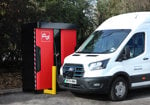No problems with MIB database
AFTER reading several letters about the MIB database causing fleets problems, I am beginning to wonder if I am missing something.
The latest letter ‘Insurance database should be simpler’ (Fleet News, November 16) says a fleet manager finds updating the database is possibly her worst task.
I run a fleet of 90 cars and have found that submitting details to the MIB database is far easier than having to advise the insurance company each time there is a change. Maybe the access to the database is different depending on which insurance company you use.
I cannot recall having any problems accessing it at all. It takes a maximum of about two minutes to enter a new vehicle and even less time to remove one.
I am not suggesting other people are not competent in updating their records, just that if it is an insurance company-related access problem it may be worth considering this on renewal. If only the congestion charge was this easy.
Fran Martin
Fleet controller, Fibernet UK
Paint pots can give you a lift
AS an avid reader of Fleet News, I notice many articles, editorials, comments and conferences deal with health and safety, corporate manslaughter, RIDDOR, risk assessment and many other subjects too numerous to mention.
There is continual publicity that frightens the living daylights out of those of us who attempt to make our living providing such services while looking out for the health and safety of our work colleagues.
So it is pleasing to note that the construction industry is showing the way: ‘Painters prefer All-in-One’ (Fleet News November 2). With the advent of the ‘working at heights regulations’ and the restriction of the use of step ladders, it would seem paint tins can give you the lift you need.
I have a driver who has trouble reaching the pedals. I wonder if it would help if I tied paint tins to his feet. I have looked in the regulations and cannot find a mention of paint tins but it must be OK if it’s in Fleet News.
Graeme Fisher
By email
Too much light is full of danger too
I GUESS I’m the only soldier in the army out of step over the daytime lighting issue.
As a pedestrian I find it harder at night, because I’m dazzled by all the bright lights.
As a cyclist I avoid going out at night because most motorists deem it perfectly OK to dazzle oncoming cyclists.
As a driver I would prefer to use only sidelights in built-up areas in the day.
If we all drive at safe speeds and with enough lighting to be seen but not to dazzle other road users, our eyes will be correctly adjusted to the conditions. This would mean we would be able to see not only where we are going, but also the pedestrian about to step out from behind a car, or the cyclist manoeuvring through the traffic.
Unfortunately, I find it necessary to use dipped headlights as a form of self-preservation.
My dipped headlights are adjusted correctly so I don’t dazzle other road users. I’d estimate that 40% of drivers don’t have their lights adjusted correctly.
There are also the drivers who don’t know how to dip their headlights, and those whose reactions are so slow they’re almost upon you before they do dip.
I therefore suffer from two major problems:
I feel too much light is at least as dangerous as too little.
Jim Larkman
Director, RK Int’l M/c Tools
Education definitely the best way forward
FURTHERING the comments by John Scott in the letters section ‘Education is key to reducing risk’ (Fleet News, November 9), I completely agree.
Our company provides hands-free kits for use when parked with the engine turned off – to keep their hands free for writing messages, holding paperwork, etc.
We make clear the dangers of using hands-free kits while on the move. We make clear the company’s position in the policy handbook whereby we advise not to use them while driving and we make clear that if drivers chose to use them, it is their personal choice and they are under no obligation by the company to do so.
Education is indeed the best way forward.
Peter Sibson
Finance director, Time Products (UK)
Sidelights would be safer
TONY Toma raves about his Bi-Xenon Dynamic Cornering headlights in your long-term Passat (Fleet News, November 16) – just what you need to be blinded by on a bright summer’s day.
In World War Two, fighter planes were fitted with high-power forward-shining lights – not for visibility but to trick the human eye’s ability to judge distance correctly.
I agree that sidelights will improve visibility during the daytime but I cannot agree that full-on headlights will improve safety. They will do the opposite.
As for Sandie Hurford’s VW FSI engine in the Skoda Octavia in the same issue, yes, they are most efficient when run on the right high-grade super unleaded fuel but looking at the car’s handbook is not a trait that company car drivers can be bothered with.
Name and address supplied
Get a letter published in Fleet News and you will receive a fantastic 512Mb computer memory stick worth £15 courtesy of fleet software and occupational road safety specialist Jaama. The stick can be filled with your own documents, presentations and spreadsheets for easy movement between computers and locations.
By writing to Fleet News you agree to have your details passed on to Jaama and may receive offers from or in association with Emap Consumer Media unless you state otherwise.















Login to comment
Comments
No comments have been made yet.